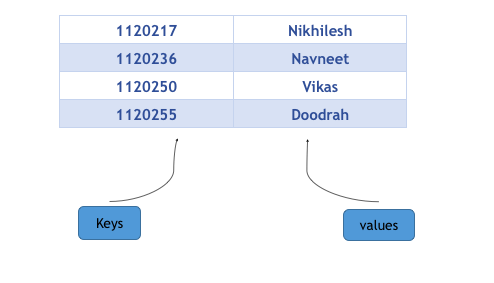map 用法
C++ 中 map 提供的是一种键值对容器,里面的数据都是成对出现的,如下图:每一对中的第一个值称之为关键字(key),每个关键字只能在 map 中出现一次;第二个称之为该关键字的对应值。在一些程序中建立一个 map 可以起到事半功倍的效果,本文为大家总结了 map 的一些基本简单的操作!

map的使用
-
需要导入头文件
#include <map> // STL头文件没有扩展名.h
- map 对象是一个模版类,需要关键字和存储对象两个模版参数
std::map<int , std::string> person;
- 可以对模版进行类型定义使其使用方便
typedef std::map<int , std::string> MAP_INI_STRING; MAP_INI_STRING person;
map 的构造
1、map 最基本的构造函数;
std::map<int , std::string> mapPerson;
2、map 添加数据;
1) 插入 函数插入对 数据
std::map < int , std::string > mapPerson; mapPerson.insert(pair < int,string > (1,"Jim"));
2)插入 函数插入 value_type 数据
mapPerson.insert(std::map < int, std::string > ::value_type (2, "Tom"));
3)用数组方式插入数据
mapPerson[3] = "Jerry";
3、地图 数据的遍历
三种最常用的遍历方法:
1)前向迭代器
std::map < int ,std::string > ::iterator it; std::map < int ,std::string > ::iterator itEnd; it = mapPerson.begin(); itEnd = mapPerson.end(); while (it != itEnd) { cout<<it->first<<' '<<it->second<<endl; it++; }
2)反向迭代器
std::map < int, string > ::reverse_iterator iter; for(iter = mapPerson.rbegin(); iter != mapPerson.rend(); iter++) cout<<iter->first<<" "<<iter->second<<endl;
3)数组形式
mapPerson.insert(std::map<int, std::string>::value_type (1, "Tom")); mapPerson[2] = "Jim"; mapPerson[3] = "Jerry"; int nSize = mapPerson.size(); for(int n = 1; n <= nSize; n++) qDebug()<<QString::fromStdString(mapPerson[n]);
三种都是遍历,建议使用前向迭代器,慎用使用数组形成(角标开始位置谨慎)。
4、map 中元素的查找:
find() 函数返回一个迭代器指向键值为 key 的元素(first),如果没找到就返回指向 map 尾部的迭代器。
map<int ,string > ::iterator l_it;; l_it = maplive.find(112); if(l_it == maplive.end()) cout<<"we do not find 112"<<endl; else cout<<"wo find 112"<<endl;
5、map 中元素的删除:
如果删除 112;
iterator erase(iterator it) ;//通过一个条目对象删除 iterator erase(iterator first,iterator last); //删除一个范围 size_type erase(const Key&key); //通过关键字删除 clear();//就相当于enumMap.erase(enumMap.begin(),enumMap.end());
6、map 中交换 的用法:
Map 中的 swap 不是一个容器中的元素交换,而是两个容器交换;
示例: #include <map>
#include <iostream> using namespace std; int main( ) { map < int, int > m1, m2, m3; map < int, int >::iterator m1_Iter; m1.insert ( pair < int, int > ( 1, 10 ) ); m1.insert ( pair < int, int > ( 2, 20 ) ); m1.insert ( pair < int, int > ( 3, 30 ) ); m2.insert ( pair < int, int > ( 10, 100 ) ); m2.insert ( pair < int, int > ( 20, 200 ) ); m3.insert ( pair < int, int > ( 30, 300 ) ); cout << "The original map m1 is:"; for ( m1_Iter = m1.begin( ); m1_Iter != m1.end( ); m1_Iter++ ) cout << " " << m1_Iter->second; cout << "." << endl; // This is the member function version of swap //m2 is said to be the argument map; m1 the target map m1.swap( m2 ); cout << "After swapping with m2, map m1 is:"; for ( m1_Iter = m1.begin( ); m1_Iter != m1.end( ); m1_Iter++ ) cout << " " << m1_Iter -> second; cout << "." << endl; cout << "After swapping with m2, map m2 is:"; for ( m1_Iter = m2.begin( ); m1_Iter != m2.end( ); m1_Iter++ ) cout << " " << m1_Iter -> second; cout << "." << endl; // This is the specialized template version of swap swap( m1, m3 ); cout << "After swapping with m3, map m1 is:"; for ( m1_Iter = m1.begin( ); m1_Iter != m1.end( ); m1_Iter++ ) cout << " " << m1_Iter -> second; cout << "." << endl; }
输出结果:
The original map m1 is: 10 20 30.
After swapping with m2, map m1 is: 100 200.
After swapping with m2, map m2 is: 10 20 30.
After swapping with m3, map m1 is: 300.
7、地图的排序问题:
Map 中的元素是自动按键 升序排序,所以不能对 map 用 sort 函数:
示例:
#include <map> #include <iostream> using namespace std; int main( ) { map < int, int > m1; map < int, int >::iterator m1_Iter; m1.insert ( pair < int, int > ( 1, 20 ) ); m1.insert ( pair < int, int > ( 4, 40 ) ); m1.insert ( pair < int, int > ( 3, 60 ) ); m1.insert ( pair < int, int > ( 2, 50 ) ); m1.insert ( pair < int, int > ( 6, 40 ) ); m1.insert ( pair < int, int > ( 7, 30 ) ); cout << "The original map m1 is:"<<endl; for ( m1_Iter = m1.begin( ); m1_Iter != m1.end( ); m1_Iter++ ) cout << m1_Iter->first<<" "<<m1_Iter->second<<endl; }
输出结果
The original map m1 is: 1 20 2 50 3 60 4 40 6 40 7 30
8、map 的基本操作函数:
C++ Maps 是一种关联式容器,包含"关键字/值"对
begin() 返回指向 map 头部的迭代器
clear() 删除所有元素
count() 返回指定元素出现的次数
empty() 如果 map 为空则返回 true
end() 返回指向 map 末尾的迭代器
equal_range() 返回特殊条目的迭代器对
erase() 删除一个元素
find() 查找一个元素
get_allocator() 返回map的配置器
insert() 插入元素
key_comp() 返回比较元素key的函数
lower_bound() 返回键值>=给定元素的第一个位置
max_size() 返回可以容纳的最大元素个数
rbegin() 返回一个指向map尾部的逆向迭代器
rend() 返回一个指向map头部的逆向迭代器
size() 返回map中元素的个数
swap() 交换两个map
upper_bound() 返回键值>给定元素的第一个位置
value_comp() 返回比较元素value的函数
4、例题 单词词频统计
题:输入大量单词,每个单词,一行,不超过20字符,没有空格。
按出现次数从多到少输出这些单词以及出现次数。出现次数相同的字典序靠前的在前面。
#include<iostream> #include<set> #include<map> #include<string> using namespace std; struct Word { int times; string wd; }; struct Rule { bool operator()(const Word& w1, const Word& w2) const { if (w1.times != w2.times) return w1.times > w2.times; else return w1.wd < w2.wd; } }; int main() { string s; set<Word, Rule>st; map<string, int>mp; while (cin >> s) ++mp[s];//mp[s]查找,若没有这插入,再次遇到相同的s输入时则这mp[s]++, for (map<string, int>::iterator i = mp.begin(); i != mp.end(); ++i) { Word tmp; tmp.wd = i->first; tmp.times = i->second; st.insert(tmp); } for (set<Word, Rule>::iterator i = st.begin(); i != st.end(); i++) { cout << i->wd << " " << i->times << endl; } }
这个代码好像有点点问题,现在我也有点看不懂了,下次过来改。
5.例题二 关于学生
#include<iostream> #include<map> #include<string> using namespace std; struct Student{ string name; int score; }; Student students[] = { {"Make",78},{"Jane",88},{"Tom",77},{"Jake",99},{"Cindy",98} }; typedef map<string, int>MP; int main() { MP mp; for (int i = 0; i < 5; ++i) mp.insert(make_pair(students[i].name, students[i].score));//插入 cout << mp["Tom"] << endl;//查找 mp["Tom"] = 60;//修改second for (MP::iterator i = mp.begin(); i != mp.end(); i++) cout << "(" << i->first << "," << i->second << ")" << endl; cout << endl; Student st; st.name = "Tom"; st.score = 97; pair < MP::iterator, bool>p = mp.insert(make_pair(st.name, st.score)); if (p.second) cout << "(" << p.first->first << "," << p.first->second << ")inserted" << endl; else cout << "inserted failed" << endl; mp["Harry"] = 78;//如果没有Harry这个人,这插入Harry,并让其second=0; MP::iterator q = mp.find("Harry"); cout << "(" << q->first << "," << q->second << ")"<<endl; return 0; }

